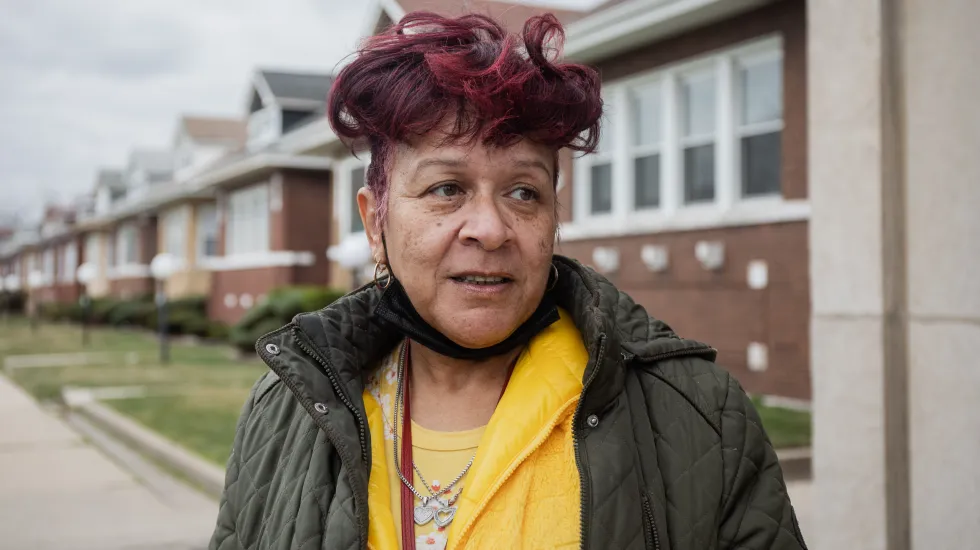The Chicago woman’s face is blurred, but her surprised voice can be heard on a viral video showing Cook County Sheriff’s deputies carrying out an eviction order for a small apartment building.
“We just moved in here in January,” explains the woman, carrying a few items as she exits the front door. “I gave my fiancé $2,000 to give to the landlord, whoever owns this building.”
But her rent didn’t go to a real landlord, says Matthew White, the process server who delivered the bad news on behalf of the building’s actual owner — a bank — and uploaded the video to TikTok on March 3 to raise awareness. Scam artists had broken into the vacant building, replaced the locks and rented it out before anyone noticed, White says.
For all the awful things the coronavirus pandemic has wrought on Chicago, you can add one more: brazen rental scams.
Local housing experts say the scams picked up speed after the pandemic shutdowns began in the spring of 2020. Vacant properties, including foreclosed apartments and houses, weren’t being closely watched — and criminals pounced.
In a typical scam, fraudsters break into an empty apartment or home, replace the locks and advertise the property online. Prospective tenants sign a lease, pay a security deposit and make monthly rent payments to the supposed “landlord,” sometimes for months, until the actual property owner finds out.
When that happens, the scammer flees and the tenant faces eviction.
White, whose clients include housing attorneys and property management companies, says he encounters the scam “eight to 10” times a week in Chicago and suburbs.
In one case, a property owner was getting ready to list a unit for rent when “people broke in, changed all the locks and had somebody else move in,” White says. “It’s so rampant.”
Lt. Scott Bailey, a detective with Lansing Police, says scammers look for foreclosed properties and if they can break into the lock box and get the keys, their next move is to list the place for rent, online, under a fake business name.
When a victim responds, the excuses begin, Bailey says. The supposed landlord says he’s out of town, but he’ll email a lease and will leave the keys. The unsuspecting new tenants send him their deposit and rent and move in — only to discover later that it was a scam.
In a similar scam, fraudsters approach apartment building residents claiming they are the new management company. Their goal: to trick tenants into rerouting their rent money to them.
That’s what JoLondon Jamerson says happened this past fall at the 38-unit building in Chatham where she’s lived for the past 17 years.
The property had changed hands and management was in flux. One day, a man came inside the building holding some papers, claiming he was from the new management company and explaining where tenants should send their rent money, Jamerson says. But it was a scam, and many fell for it, she says.
After the economic hardship of the pandemic, “it’s like a slap in your face,” Jamerson says. The scammers, she says, “are so malicious and evil that [they] actually set up and plan a way to scheme people out of their money.”

Sam Clendenning, a community organizer with the Metropolitan Tenants Organization, says victims can be devastated financially.
“It’s really distressing to learn that all this money they’ve been paying doesn’t go to who they thought it was going to,” he says.
In some cases, a deal can be worked out where the tenants sign a new, real lease with the actual property owner, says Chicago attorney Richard Magnone, who represents property owners in court and writes a blog for landlords.
“That would probably be my first advice to my client: ‘Well, you have a tenant if you want one,’ Magnone says. “Working with them to make them a tenant is not a horrible idea, because they, too, are victims.”
Other times, though, tenants don’t respond to the true property owner’s communications and then eviction proceedings start.
Clendenning says creating a citywide rental registry could help prevent scams by giving prospective renters an easy way to figure out who really owns a building.
He adds that property owners should better secure their buildings. On a recent day he visited 24 buildings for his job, and all had doors that were unlocked.
“There was not a single building I was not able to get into,” he says. “These are buildings that are ripe for this sort of scam.”







